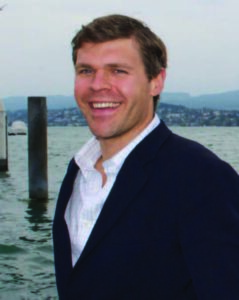By Nikki Hunt
Predominately publicized as a disease affecting women, Christopher Skarinka opens up about his battle with bulimia.
The National Eating Disorders Association is the United States’ leading nonprofit organization advocating for individuals and families affected by eating disorders. Formed in 2001, NEDA campaigns for prevention, quality treatment, and increased research funding.

Christopher Skarinka
Christopher Skarinka has been NEDA treasurer and junior board member for more than two years. “My primary function is outreach, both broadly speaking and more targeted specifically towards men and athletes. This involves speaking on panels and at conferences, as well as writing articles and organizing outreach and fundraising events.”
Skarinka found NEDA after recovering from his own eating disorder after college. “I first started engaging in bulimic behaviors shortly after turning 20 years old, when I was a rower in college. For the next four and a half years, I suffered mostly in silence as these behaviors controlled more and more of my life. I did everything to hide it. It was a very private disease for me. It took two years before I told a single soul, and fewer than ten people knew before I recovered.”
Skarinka worried the news of his eating disorder would break at work. “The anxiety that a colleague or business associate would discover my disease would often keep me up at night. I was an investment banking analyst at the time, often spending more than 100 hours a week at the office. I didn’t know how those around me would react.”
While almost no one knew about his disease, Skarinka says family and friends noticed a change in his behavior. “I was less outgoing, positive, and jovial, and more defensive—quick to anger. My personal relationships suffered. I spent less time with friends and more time by myself. I was less engaging than I could be at the office and would avoid meal times with coworkers.”
After four years of battling bulimia, Skarinka sought help and committed to the recovery process. Within two months of therapy, he stopped engaging in bulimic behaviors. Six months later, he was on the road to full recovery.
Even with his progress, Skarinka says it was difficult to find help. “Resources predominately catered to women. Literature included only feminine pronouns, pictures showed only women, and counselors and practitioners all seemed to be women. I felt like the outlier.”
Skarinka was far from alone. According to NEDA, 10 million men in the United States suffer from a clinically significant eating disorder at some point in their lives. A leading reason men don’t speak out is the female-oriented focus of the dialogue surrounding the disease.
“Changing this dialogue is a big part of why I joined NEDA.”
Since his recovery, Skarinka has been vocal about his past with bulimia. “I’ve been very public about my recovery, including an article in a major U.S. newspaper. And I can unequivocally say the response of current and former colleagues who have reached out has been one of universal support and admiration. People seem to understand and are impressed by the determination it takes to seek help for an eating disorder.”
Skarinka says that some of the warning signs to look for are binge eating/ purging, food rituals (skipping food groups, rearranging food on plate), excessive exercise, drastic weight loss, preoccupation with counting calories, and taking laxatives/diuretics to control weight. For a full list of warning signs and other resources for those looking to understand and support loved ones with eating disorders, visit NEDA’s website. “NEDA has helped me reach a greater audience for my message: That recovery is possible. It has broadened my ability to displace the myth that eating disorders only affect young women. The organization has introduced me to other smart, passionate individuals who share my commitment to eating disorder outreach.”
Skarinka hopes his story will lead others to seek help. “Full recovery is 100 percent possible. There isn’t a day that goes by that I don’t wish I had sought help earlier. Life after recovery is much more fun.”






